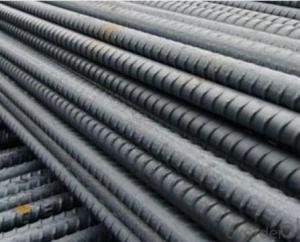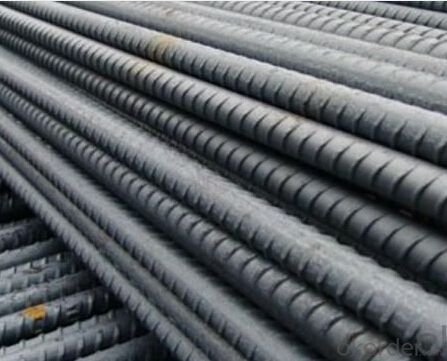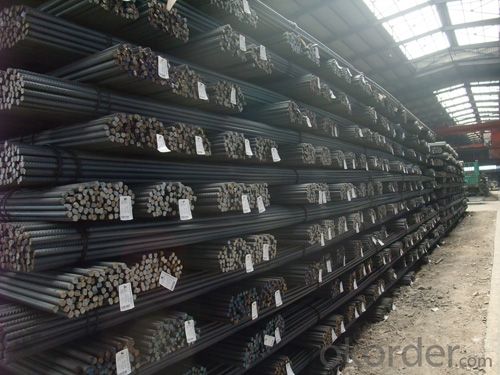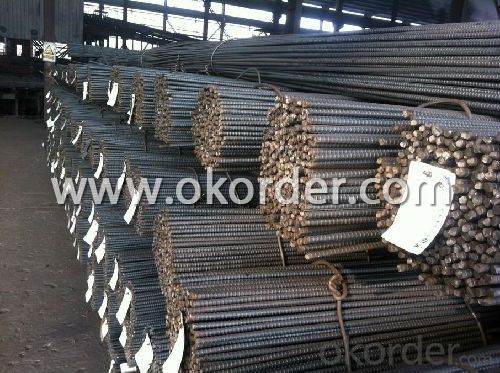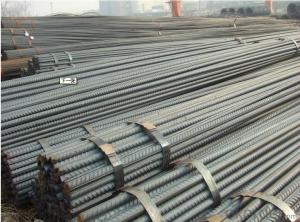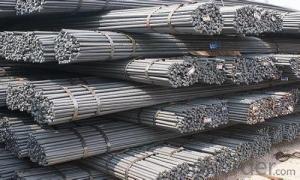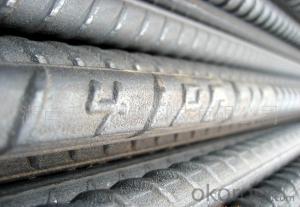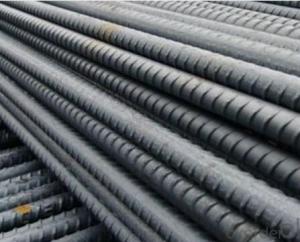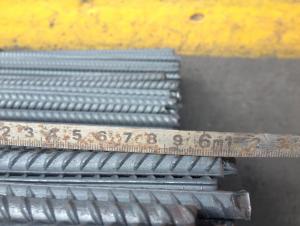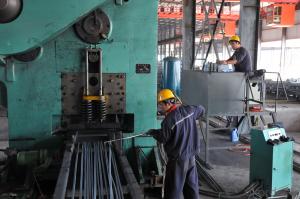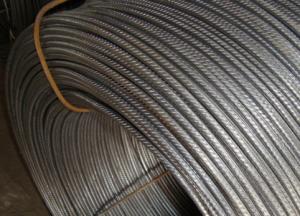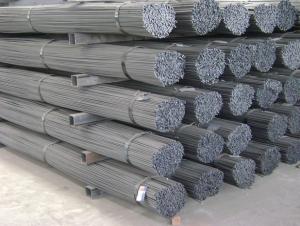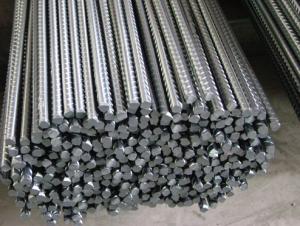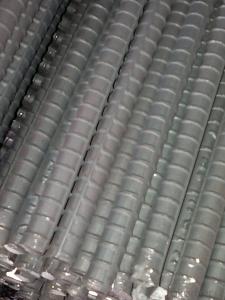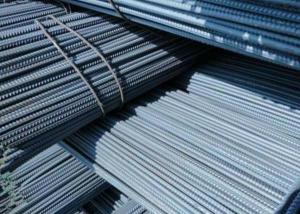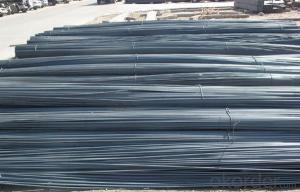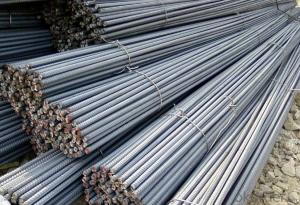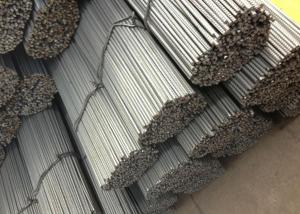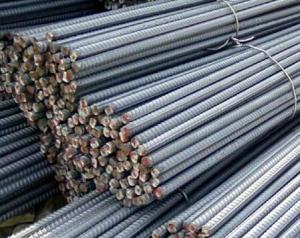Hot Rolled Steel Rebars for Concrete Reinforcing
- Loading Port:
- Tianjin
- Payment Terms:
- TT or LC
- Min Order Qty:
- 100 m.t.
- Supply Capability:
- 10000 m.t./month
OKorder Service Pledge
OKorder Financial Service
You Might Also Like
OKorder is offering Hot Rolled Steel Rebars for Concrete Reinforcing at great prices with worldwide shipping. Our supplier is a world-class manufacturer of steel, with our products utilized the world over. OKorder annually supplies products to African, South American and Asian markets. We provide quotations within 24 hours of receiving an inquiry and guarantee competitive prices.
Product Applications:
Hot Rolled Steel Rebars for Concrete Reinforcing are ideal for structural applications and are widely used in buildings, bridges, roads and other engineering construction. Big to highways, railways, bridges, culverts, tunnels, public facilities such as flood control, dam, small to housing construction, beam, column, wall and the foundation of the plate, deformed bar is an integral structure material..
Product Advantages:
OKorder's Hot Rolled Steel Rebars for Concrete Reinforcing are durable, strong, and wide variety of sizes.
Main Product Features:
· Premium quality
· Prompt delivery & seaworthy packing (30 days after receiving deposit)
· Can be recycled and reused
· Mill test certification
· Professional Service
· Competitive pricing
Product Specifications:
Standard | GB UK USA | HRB335 HRB400 HRB500 G460B, B500A, B500B,B500C GR40, GR60 | |
Diameter | 6mm,8mm,10mm,12mm,14mm,16mm,18mm,20mm, 22mm,25mm,28mm,32mm,36mm,40mm,50mm | ||
Length | 6M, 9M,12M or as required | ||
Invoicing | Actual or Theoretical Weight Basis as buyer’s request. | ||
Type | Hot rolled steel rebar | ||
Diameter(mm) | Section area (mm²) | Mass(kg/m) | Weight of 12m (kg) | Pcs/ton |
6 | 28.27 | 0.222 | 2.664 | 375.38 |
8 | 50.27 | 0.395 | 4.74 | 210.97 |
10 | 78.54 | 0.617 | 7.404 | 135.06 |
12 | 113.1 | 0.888 | 10.656 | 93.84 |
14 | 153.9 | 1.21 | 14.52 | 68.87 |
16 | 201.1 | 1.58 | 18.96 | 52.74 |
18 | 254.5 | 2.00 | 24 | 41.67 |
20 | 314.2 | 2.47 | 29.64 | 33.74 |
22 | 380.1 | 2.98 | 35.76 | 27.96 |
25 | 490.9 | 3.85 | 46.2 | 21.65 |
28 | 615.8 | 4.83 | 57.96 | 17.25 |
32 | 804.2 | 6.31 | 75.72 | 13.21 |
36 | 1018 | 7.99 | 98.88 | 10.43 |
40 | 1257 | 9.87 | 118.44 | 8.44 |
50 | 1964 | 15.42 | 185.04 | 5.40 |
FAQ:
Q1: Why buy Materials & Equipment from OKorder.com?
A1: All products offered byOKorder.com are carefully selected from China's most reliable manufacturing enterprises. Through its ISO certifications, OKorder.com adheres to the highest standards and a commitment to supply chain safety and customer satisfaction.
Q2: How many tons of steel products could be loaded in containers?
A2: Usually the steel products are delivered by bulk vessel because of the large quantity and the freight. However, there are no bulk vessel enter some seaports so that we have to deliver the cargo by containers. The 6m steel product can be loaded in 20FT container, but the quantity is changed according to the size, usually from 18tons to 25tons.
Q3: How soon can we receive the product after purchase?
A3: Within three days of placing an order, we will arrange production. The normal sizes with the normal grade can be produced within one month. The specific shipping date is dependent upon international and government factors, the delivery to international main port about 45-60days.
Images:
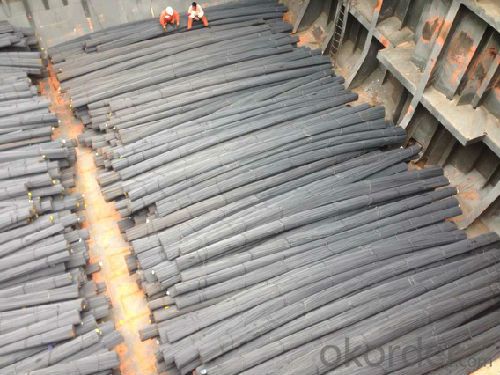
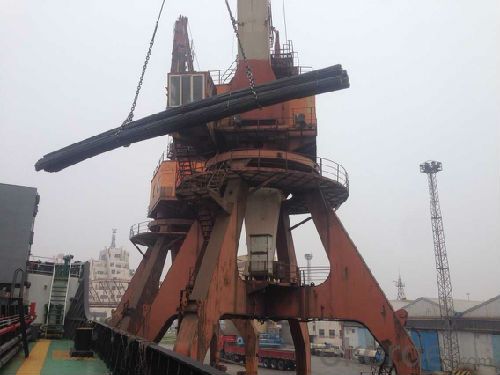
- Q: Can steel rebars be used in tunnels and underground structures?
- Yes, steel rebars can be used in tunnels and underground structures. They are commonly used to reinforce and strengthen the concrete used in these structures, providing additional stability and load-bearing capacity.
- Q: How do steel rebars affect the overall sound insulation of a building?
- Steel rebars do not have a direct impact on the overall sound insulation of a building. The primary purpose of steel rebars in construction is to reinforce concrete structures and provide strength and stability. Sound insulation is primarily influenced by the materials and design of the walls, floors, and ceilings, as well as proper installation of acoustic barriers and insulation materials. While steel rebars can transmit sound to some extent due to their density, their impact on sound insulation is generally negligible compared to other factors. Sound insulation in buildings is achieved by using materials with high sound absorption properties, such as acoustic insulation panels, mineral wool, or soundproofing barriers.
- Q: What are the factors that affect the durability of steel rebars in concrete?
- There are several factors that can affect the durability of steel rebars in concrete. These include the quality of the steel used, the level of corrosion protection provided, the design and construction practices, the exposure conditions (such as moisture and temperature), and the presence of aggressive chemicals in the surrounding environment.
- Q: Can steel rebars be welded or spliced together?
- Yes, steel rebars can be welded or spliced together. This process involves connecting two or more rebars by either welding them using heat and electricity or by splicing them together using mechanical connectors.
- Q: What are the factors that affect the strength of steel rebars?
- The strength of steel rebars can be affected by several factors. These factors include the composition of the steel bar, the manufacturing process used, the size and shape of the rebar, heat treatment processes, corrosion, and the loading conditions applied to the rebars. The composition of the steel bar is crucial in determining its strength. Steel rebars typically contain carbon, with a content ranging from 0.15% to 0.6%. This carbon content affects the hardness and strength of the rebar. Additionally, other elements such as manganese, silicon, and sulfur can also impact the rebar's strength. The manufacturing process used to produce the steel rebars can also influence their strength. Hot rolling is commonly employed, which involves heating the steel billets to high temperatures and shaping them by passing them through rollers. The cooling rate during this process can cause variations in the internal microstructure of the bar, resulting in differences in strength. The size and shape of the rebar are significant factors in determining its strength. Thicker and larger diameter rebars generally have higher strength capacities compared to thinner ones. Furthermore, the shape of the rebar, whether it is a plain round bar or has deformations like ribs, can also impact its strength. Heat treatment processes can be applied to steel rebars to enhance their strength. For example, quenching and tempering involve heating the rebar to a high temperature and then rapidly cooling it, increasing its strength and hardness. The specific heat treatment process used depends on the desired strength requirements. Corrosion can significantly reduce the strength of steel rebars over time. When exposed to moisture and oxygen, steel rebars can rust, leading to structural degradation. Proper corrosion protection measures, such as epoxy coating or galvanization, are essential for maintaining the strength and durability of the rebars. The type and magnitude of the applied loads also influence the strength of steel rebars. Different applications require rebars with varying strength capacities. Therefore, the design and engineering of structures should consider the expected loads to determine the appropriate strength of the rebars used. In conclusion, the strength of steel rebars is influenced by their composition, manufacturing process, size and shape, heat treatment, corrosion protection, and the loading conditions they will experience. It is crucial to consider these factors when selecting and using steel rebars in construction projects.
- Q: Are steel rebars subject to any international standards or regulations?
- Yes, steel rebars are subject to international standards and regulations. The most widely recognized standard for steel rebars is the ASTM A615/A615M-20, which provides specifications for deformed and plain carbon-steel bars for concrete reinforcement. Additionally, various countries and regions may have their own specific standards and regulations regarding the production, testing, and use of steel rebars to ensure their quality and performance in construction projects.
- Q: Can steel rebars be used in stadium construction?
- Steel rebars are indeed applicable for stadium construction. These reinforcing steel bars are frequently utilized in concrete construction to confer robustness and stability. In the realm of stadium construction, steel rebars are extensively incorporated into reinforced concrete structures like columns, beams, slabs, and foundations. They are strategically positioned within the concrete to augment its capacity to bear loads and avert cracking or failure amidst substantial burdens and vibrations. By employing steel rebars, the stadium's structural integrity and longevity are ensured, granting it the ability to endure the tremendous pressures and forces exerted during sporting events and gatherings of a considerable audience.
- Q: Are steel rebars suitable for use in high-temperature applications?
- High-temperature applications are generally not suitable for the use of steel rebars. Despite being a strong and durable material, steel has limitations when exposed to high temperatures. It can undergo a significant reduction in strength and even a loss of structural integrity, leading to potential failures. When subjected to high temperatures, steel goes through a process known as thermal expansion, which can weaken and deform it. This phenomenon is particularly noticeable in rebars, which are commonly used to reinforce concrete structures. The high temperatures cause the rebars to expand, exerting excessive pressure on the surrounding concrete. This pressure can result in cracks and potentially compromise the stability of the structure. Furthermore, prolonged exposure to high temperatures can cause a loss of the steel's mechanical properties, including its tensile strength and load-bearing capacity. As a result, the rebars become less effective in resisting external forces and reinforcing the concrete. For this reason, it is generally recommended to consider alternative materials, such as stainless steel or special alloys, for high-temperature applications. These materials are specifically designed to withstand elevated temperatures without compromising their structural integrity. To ensure safety and structural stability, it is important to consult with experts and engineers who are familiar with high-temperature applications in order to determine the most suitable materials for specific projects.
- Q: What is the cost of steel rebars per ton?
- The cost of steel rebars per ton varies depending on several factors such as market conditions, demand, and quality of the rebars. It is recommended to consult with suppliers or check current market prices for an accurate cost estimate.
- Q: Can steel rebars be used in structures with limited construction permits?
- Steel rebars can typically be used in structures with limited construction permits, as they are commonly used in construction due to their strength and durability. However, it is important to consult the specific regulations and limitations outlined in the construction permits. These permits may have restrictions on the types of materials that can be used, including the size and composition of rebars. It is advisable to consult with a structural engineer or the local building authority to ensure compliance with the construction permits and to determine if steel rebars are allowed in the particular structure.
Send your message to us
Hot Rolled Steel Rebars for Concrete Reinforcing
- Loading Port:
- Tianjin
- Payment Terms:
- TT or LC
- Min Order Qty:
- 100 m.t.
- Supply Capability:
- 10000 m.t./month
OKorder Service Pledge
OKorder Financial Service
Similar products
Hot products
Hot Searches
Related keywords
